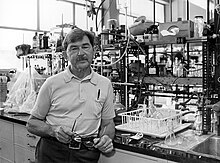Henry Taube
Henry Taube (born November 30, 1915 in Neudorf , Saskatchewan , † November 16, 2005 in Palo Alto , California ) was an American chemist . He received the Nobel Prize in Chemistry in 1983 because he succeeded in elucidating the reaction mechanisms of electron transfer in metal complexes .
Life
Henry Taube was born in the Canadian town of Neudorf in the province of Saskatchewan . His German-speaking parents emigrated to Canada from what is now Ukraine in 1911. He studied chemistry at the University of Saskatchewan in Saskatoon and then moved to the University of California at Berkeley . His doctorate took place in 1940. In 1942 he took on the US citizenship. In 1952 he followed a call to a professorship for inorganic chemistry at Stanford University . In 1978 he became head of the chemistry department at Stanford University.
Taube was mainly concerned with the transfer of electrons between ions in chemical reactions. In doing so, he mainly developed theoretical models of the process that were of fundamental importance for later research.
In the 1960s and 1970s, his work focused on the reactions involved in the transfer of electrons from transition metals in solutions . He was able to explain that there are two different ways of electron transfer, which he termed the outer-sphere mechanism and the inner-sphere mechanism . To distinguish, he took the ions involved as a basis, since in the outer-sphere mechanism the transfer from the reduction ion to the oxidation ion takes place energetically below the activation barrier. This is due to the proximity of the ions to one another and the reconfiguration of the charges in the relevant environment (inner coordination sphere ) with ions of different charges.
With the inner sphere mechanism, which he studied intensively using the example of the Creutz-Taube complex , he was able to explain the role of the coordination sphere. A ligand from this environment acts as a “bridge” between the ions that exchange electrons. Taube was able to prove that this bridging function occurs particularly effectively with organic mediators compared to simple inorganic compounds.
Honors
Taube received the Nobel Prize in Chemistry in 1983 . In 1976 he had already received the National Medal of Science , in 1985 the Priestley Medal of the ACS. He has received numerous honorary doctorates (including from the University of Saskatchewan and the University of Chicago ) and was (honorary) member of numerous scientific societies (e.g. Royal Society of Canada , National Academy of Sciences , American Academy of Arts and Sciences (1961) , American Philosophical Society (1981)).
literature
- Bernhard Kupfer: Lexicon of Nobel Prize Winners , Patmos Verlag Düsseldorf 2001 ( ISBN 3-491-72451-1 )
- Brockhaus Nobel Prizes - Chronicle of Outstanding Achievements , Brockhaus, Mannheim 2004 ( ISBN 3-7653-0492-1 )
Web links
- Information from the Nobel Foundation on the 1983 award ceremony for Henry Taube
- "Henry Taube, Nobel laureate in chemistry, dies at age 89" (Stanford University November 17, 2005)
| personal data | |
|---|---|
| SURNAME | Dove, henry |
| BRIEF DESCRIPTION | American chemist and Nobel Prize winner |
| DATE OF BIRTH | November 30, 1915 |
| PLACE OF BIRTH | Neudorf , Saskatchewan , Canada |
| DATE OF DEATH | November 16, 2005 |
| Place of death | Palo Alto , California |
